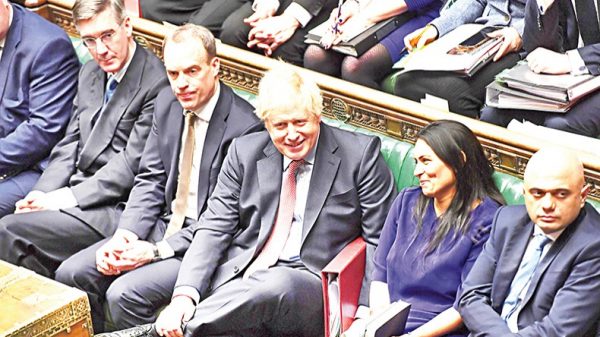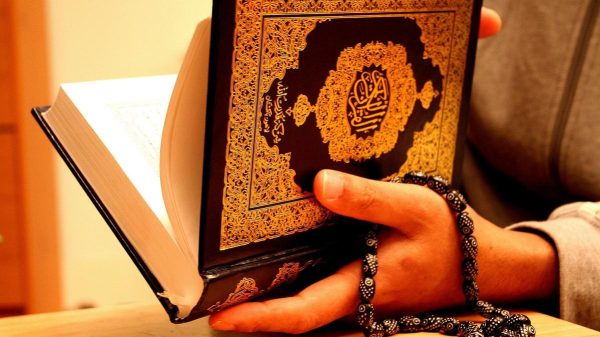Johnson’s Brexit fantasies

- Update Time : Sunday, February 2, 2020
- 336 Time View

IMMEDIATELY after his general election victory, BoJo jetted to the private Caribbean island of Mustique with his latest mistress. Sequestered in a rental villa that cost $26,000 a week for a couple of weeks (probably paid for by one of his billionaire pals), and supposedly chugging down vodka martinis while sunning his plump frame on the beach, BoJo was unavailable for a response at the start of the Iran crisis. Not that he would have done much. With an unenviable track-record when it comes to being Trump’s lapdog, his response would have been all-too predictable.
Parliament started its post-New Year session, but everything was low-key and there wasn’t much to do, as the Tories sat on their comfortable 80-seat majority, and Labour was in the process of choosing its next leader, with Jeremy Corbyn as its lame-duck leader until his successor is chosen.
BoJo is easily bored, so most parliamentary business was left to his talentless subordinates.
In his two political positions before he became prime minister — mayor of London and foreign secretary — BoJo was averse to any kind of administrative heavy-lifting, preferring to leave this to his staff.
Philandering apart, BoJo’s energy levels are lifted by vanity projects and publicity stunts.
His vanity projects (buying second-hand water cannon from Germany even though the London police didn’t want them; they were sold for scrap later), a white-elephant garden bridge across the Thames which was never built (but whose preparatory work cost $56 million of public money), and playing to nostalgia by reintroducing a red double-decker bus with failed air-conditioning and windows that can’t be opened (and which cost twice as much to build as its celebrated but abandoned predecessor).
BoJo’s failed publicity stunts include being stuck on a zipline, 5 metres above ground, during the 2012 London Olympics. BoJo, in a suit and wearing a hard hat and waving two plastic Union Jack flags, had to be hauled to the ground by staff using a tow line.
Invigorated by his sojourn in Mustique, BoJo embarked on his latest stunt: to have the Big Ben bell ring at 11pm on Brexit day, January 31.
Big Ben has been undergoing renovations since 2017, though a temporary floor had been put in place to strike the 13-ton bell during Remembrance Sunday and at the New Year. The floor has since been removed and would need to be reinstalled at a cost of $650,000.
A parliamentary commission dismissed the plan because of the cost, so BoJo went along with the suggestion made by a couple of his buffoonish Brexiter MPs to launch an online GoFundMe campaign called ‘Big Ben must bong for Brexit’ to pay for the chimes. As of January 23, the campaign has raised around 250,000 euros of its 500,000 euro target, so it is unlikely that Brexiters will get their Big Bong celebration.
The next stage in the Brexit saga, apart from the official EU exit date of January 31, will be the presumed conclusion of a trade deal with the EU by the end of 2020.
Agreeing to negotiate a deal and setting up a provisional timetable (though the two sides have different versions of it), has been relatively easy, while actually negotiating the deal will of course be the difficult part.
Both sides know what they want from the deal (in the UK’s case this is a trade deal compatible with its Brexit aspirations — which so far seem no more than mouthing the Tory election slogan ‘Get Brexit Done’— and its need to make trade deals with other countries, while the EU is open to this provided certain conditions are met and its trading interests protected).
Both sides know how far they’re prepared to yield on each point (eg the sum paid for the ‘divorce settlement’ is the point on which both sides will probably be most flexible, regulatory alignment between the UK and EU will probably be the most difficult, arrangements regarding fishing rights will be somewhere in between, etc.)
Moreover, both sides typically know where the other’s baselines are (in the case of the EU, this will be the Irish Republic’s final terms for its trade and diplomatic relations with the North — the Republic being an EU member, the EU will set these terms as a negotiating baseline rather than go against them).
In the case of the UK, a baseline is likely to be fishing rights, since the French, Danish and Dutch are keen on access to British waters, while the UK is set against this move.
Another EU baseline, which tripped-up Theresa May when she was prime minister, was the EU’s insistence on ‘sequencing’ talks, so the UK has to agree one set of issues before the EU will move to another set.
Agreement will not be reached, or be much harder to reach, if a side insists that one or more of the other side’s baselines be crossed (eg the UK will almost certainly demand that the EU separate the ‘four freedoms’ — movement, goods, capital, services — because the UK won’t accept free movement between itself and the EU countries, but may be willing to allow the other freedoms to exist, with or without modification).
Sticking points: both the UK and EU have to determine what protections they require to prevent the other side from using the deal to misuse their respective markets. For example, the EU will be determined to ensure that any UK-EU deal will not be a way for US food imports to circumvent EU food standards.
For instance, if the UK undertook to uphold EU food standards in its trade deal with the EU, then while US chlorinated chicken, irradiated fruit, etc. can be imported into UK markets, they will not then be exported from the UK into the EU market.
Another EU baseline would be not allowing the UK an unfair post-Brexit competitive advantage. The EU will not sign-up to a trade deal that allows tariff free, quota free and frictionless access to UK goods being imported into the EU if there isn’t a level playing field in terms of production standards, and so on, because that would constitute unfair competition. The EU would not therefore allow a product into the EU via the UK that happens to be cheaper or of lower quality because of differing production standards.
For instance, the EU requires milk chocolate to contain at least 20 per cent dry cocoa solids and darker chocolates to contain a minimum of 35 per cent dry cocoa solids. In the US, the Food and Drug Administration mandates that American milk chocolate must contain at least 10 per cent dry cocoa solids, and that semisweet and bittersweet American chocolate must contain at least 35 per cent dry cocoa solids. The British chocolate manufacturer Cadburys also has an operation in the US, licensed to Hershey, meaning that American chocolate bearing the Cadbury name is actually produced by Hershey.
The EU might baulk at the movement into the EU of Cadbury chocolate made by Hershey, and brought to the UK before being exported to the EU. Semisweet and bittersweet American chocolate would of course pass muster because their required cocoa-solid content is the same as the EU’s.
It is a misimpression to think that all EU trade deals are handled by Brussels exclusively. Some deals covering policy areas that are not the sole preserve of Brussels have to be voted on by national parliaments, and sometimes regional parliaments, depending on the constitution of the EU-member-state in question.
These hybrid deals can be fraught with difficulty because each country and region has its own commercial interests to consider before signing.
The more extensive a trade deal is, the greater the likelihood of it going beyond the authority of Brussels and requiring the approval of individual member states.
Deals that involve cross-border trade in services — a key UK objective — are very likely to be hybrid agreements and thus subject to votes in the relevant national parliaments. The EU has already said that the final agreement will have to be ratified by all 27 member states.
This is why a trade deal between the EU and other countries takes 4–7 years to bring to the gate, and it shows why the BoJo is living in cloud cuckoo land (as are his Brexiter supporters), if he thinks he can get a complete deal by the end of this year. But posturing and privileged incompetence are BoJo’s forte, not attention to detail and technicalities.
The European Commission president Ursula von der Leyen has already made it clear that BoJo will not get a complete deal if he insists that one must be finalised by the end of 2020. The European Commission has also said the EU will not be ready to open trade talks with the UK on a post-Brexit trade deal before the end of February, which leaves only 10 months for the UK to finalise a trade deal.
I’ve only mentioned a few of the complexities involved in each side’s baselines, and there will be hundreds of them!
The EU also has the upper hand when it comes to bringing heft to the negotiating table. A mere nine per cent of EU trade is with the UK while 47 per cent of British exports of goods go to the EU.
Apart from an EU deal, BoJo will also want one with the US and China. In fact, he intends to pursue parallel trade talks with the EU and the US after Brexit Day on Friday, with some hardline Tory Brexiters convinced they can be played off against each other. Faced with the prospect of a ‘bidding war’ with the US, the EU’s Brexit negotiator Michel Barnier has said, ‘There will be no overbidding on our side’.
Barnier has also said that border checks on goods will ‘become the norm’ after Brexit — even if Johnson secures the no-tariff, no-quota deal he seeks.
At the moment, BoJo seems to be concentrating on a trade deal with the US rather than China, with its potential impact on the National Health Service drug pricing and NHS outsourcing to the American health industry, and importing American chlorinated chicken or hormone-fed beef.
But a trade deal with the US is likely to include provisions that militate against one with China. To quote The Guardian: ‘But the US has another priority: to constrain the growth of China’s economy as far as possible, particularly in areas such as tech. The new US-Canada-Mexico trade agreement has a “poison pill” clause, which would allow the US to pull out if either of the other two countries signs a trade agreement with a ‘non-market’ economy such as China. The US is likely to demand a similar clause in a US-UK agreement’.
The Trump administration is also demanding that Huawei, the Chinese tech giant, be excluded from bids to supply the UK’s 5G network. This US baseline for a UK-US trade deal is therefore likely to breach a major Chinese baseline for a China-UK trade deal.
The Tory Brexiters have long been saying that membership of the EU makes the UK a perpetual ‘rule taker’.
They will be in for a surprise when the UK begins trade negotiations with the US. All they need do is ask the Canadians who the ‘rule taker’ is when they engage in painful trade negotiations with their powerful neighbour!
At present, a mere 3.5 per cent of the UK’s exports go to China, less than the UK’s trade with Ireland, whose economy is minuscule compared to China’s.
Britain’s huge financial services sector has limited access to China, and the UK’s focus on any trade deal with China will almost certainly be on increasing this access.
But here there are likely to be stumbling blocks, especially since the UK’s financial sector has an unenviable reputation for being the money-laundering capital of the world. To quote The Daily Coin: ‘In 2016 Italian journalist Roberto Saviano, who has spent most of his career investigating the mafia, claimed Britain was the most corrupt country in the world. Saviano told an audience at the Hay-on-Wye Book Festival: “If I asked you what is the most corrupt place on Earth you might tell me well it’s Afghanistan, maybe Greece, Nigeria, the South of Italy and I will tell you it’s the UK. It’s not the bureaucracy, it’s not the police, it’s not the politics but what is corrupt is the financial capital. 90 per cent of the owners of capital in London have their headquarters offshore”.’
The Daily Coin also quotes Nicholas Wilson, a whistleblower on the criminal activities of London’s banks:
‘He [Wilson] said: “Nothing can be done to clean up the city of London. If any politician tried to dismantle the city of London the world economy would collapse. Drugs money was the only thing that kept the banks going during the 2008 financial crisis.”
‘In 2016, the Home Affairs Select Committee claimed that 100 billion euros in illicit money was being laundered in the London property market every year.
‘Mr Wilson said the bank with the worst reputation was HSBC, which he said was implicated in 18 of the 25 top corruption scandals listed by the watchdog Transparency International last year.
‘Mr Wilson said the political and financial establishments were closely entwined and he said there have been numerous examples of former MPs and ministers going to work for banks and former bankers entering politics or influential jobs.
‘The City of London Corporation declined to comment, and the Financial Conduct Authority, which was also approached, did not provide a comment’.
It will be interesting to see what the Chinese government, which keeps its own banking sector on a tight leash, will do when BoJo and his emissaries come with a request to open China’s financial doors to cowboys from London’s banks, eager and coked-up to unload their toxic financial instruments on Chinese markets.
CounterPunch.org, January 29. Kenneth Surin teaches at Duke University, North Carolina.





















